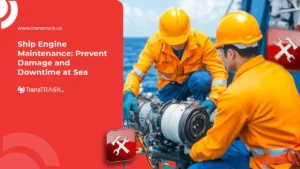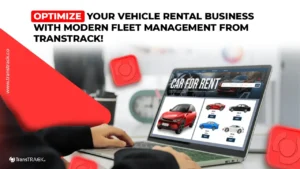What is Sea Toll? Here is the Definition and Benefits for Various Industrial Sectors
Posted on January 29, 2024 by Nur Wachda Mihmidati

The sea toll is a sea transportation system that connects major ports in Indonesia with the aim of improving inter-island connectivity, accelerating the distribution of goods and logistics, and encouraging Indonesia’s economic growth.
The principle is similar to land tolls, but sea tolls involve water as the main route. The use of sea tolls not only facilitates the movement of goods, but also optimizes shipping routes and significantly reduces logistics costs.
The logistics industry and export and import business are growing rapidly as globalization continues. In the face of these demands, the sea highway is one of the more calculated logistics solutions.
This article TransTRACK will discuss in depth about sea tolls, important benefits, how they work, and their impact on the logistics industry sector and the export and import business. So, let’s listen so that your insights regarding the sea transportation system are broader.
Basic Principles of Sea Toll
Sea toll is a concept in the transportation system that emphasizes the use of sea lanes as a distribution route for goods and cargo. To better understand the concept of the sea transportation system in depth, here is an explanation:
Strategic Distribution Centers
This marine transportation system makes use of strategic distribution centers at various ports. These distribution centers are designed in such a way as to accommodate a large number and variety of goods. With its strategic location, goods can be easily distributed to various destinations, supporting overall logistics efficiency.
Integration with Sea Transportation Modes
This marine transportation system is based on the concept of integrating marine transportation modes as the main distribution route. Cargo ships are the main means of transporting goods from one port to another. By utilizing sea lanes, sea tolls can overcome geographical constraints that are often faced by land or air transportation modes.
Optimization of Shipping Routes
One of the principles of this sea transportation system is the optimization of shipping routes. By selecting the most efficient sea routes, sea tolls can minimize mileage, travel time, and overall operational costs. Proper route selection also helps in reducing environmental impact, making sea tolls a sustainable logistics solution.
Benefits of Sea Tolls in the Logistics Industry
The benefits of this sea transportation system in the logistics industry are significant, playing an important role in improving efficiency, reducing costs, and supporting economic growth. Here is a detailed explanation of the benefits of sea tolls in the logistics industry:
Logistics Cost Savings
Compared to other modes of transportation such as land or air, this marine transportation system offers lower shipping costs. The use of water as the main route reduces fuel costs and operational costs, which can then be reflected in the final cost of the product or goods. These savings are key for logistics companies to increase their profitability.
Reduction in Road Congestion
By shifting most of the transportation burden to the sea, the marine transportation system helps to reduce congestion on roads. This not only reduces the risk of congestion, but also supports environmental sustainability by reducing greenhouse gas emissions from motor vehicles.
Optimizing Delivery Routes
This sea transportation system allows optimization of freight delivery routes. By using efficient sea lanes, logistics companies can create more direct and economical routes. This reduces travel time and increases delivery speed, which is especially important in the logistics industry where time is often a critical factor.
Implications of Sea Toll on Import-Export Business
The import-export business is one of the economic sectors that is strongly influenced by the efficiency and reliability of the logistics system. In this context, the sea transportation system has significant implications for the dynamics of the export-import business. Let’s explore the positive impact of sea tolls on export businesses.
Easier Access to International Markets
One of the main impacts of using this sea transportation system in the import-export business is that it provides easier access to international markets. Ports connected through sea tolls create efficient logistics pathways, allowing companies to more quickly and effectively reach customers in different parts of the world.
Lead Time Reduction
A short lead time is a key factor in a successful import and export business. By utilizing this marine transportation system, companies can reduce the time it takes to deliver goods from one point to another. This reduction in lead time not only improves customer satisfaction but also provides a competitive advantage in the fast-changing global market.
Reduced Risk of Delay and Loss of Goods
Shipping delays and goods losses are serious problems in the import-export business. Sea tolls, with their large shipping capacity and careful risk management, can help mitigate these risks. Integrated systems and real-time monitors allow companies to quickly respond and address issues that may arise.
The sea highway is a crucial element in supporting the growth and sustainability of various industrial sectors, especially the logistics industry and export-import business. Through the utilization of this sea transportation system, companies can create a logistics system that is more efficient, sustainable, and responsive to the growing demands of the global market.
For export-import and logistics businesses, the utilization of TransTRACK’s Logistic Service Integrator (LSI) technology can be an effective solution to improve the distribution of goods through sea tolls.
With LSI, businesses can automate logistics processes, reduce operational costs, and increase the speed of response to market changes. For import-export businesses that rely on this marine transportation system, LSI facilitates seamless coordination between ports, vessel fleets, and distribution centers, ensuring the availability of real-time information for faster and more accurate decisions.
In addition, businesses can also improve responsiveness to market demand, optimize shipping routes, and design sustainable logistics strategies through sea tolls, opening the door to greater efficiency and higher competitiveness in the global import-export sector. So, for those of you who are interested in using Logistic Service Integrator technology, don’t hesitate to contact TransTRACK. Hopefully this article can meet your needs and provide useful information!
Topic :
Recommended Articles

Improving Fleet Safety through Traffic Accident Prevention with ADAS
Featured Product | February 12, 2026
 Bahasa Indonesia
Bahasa Indonesia







